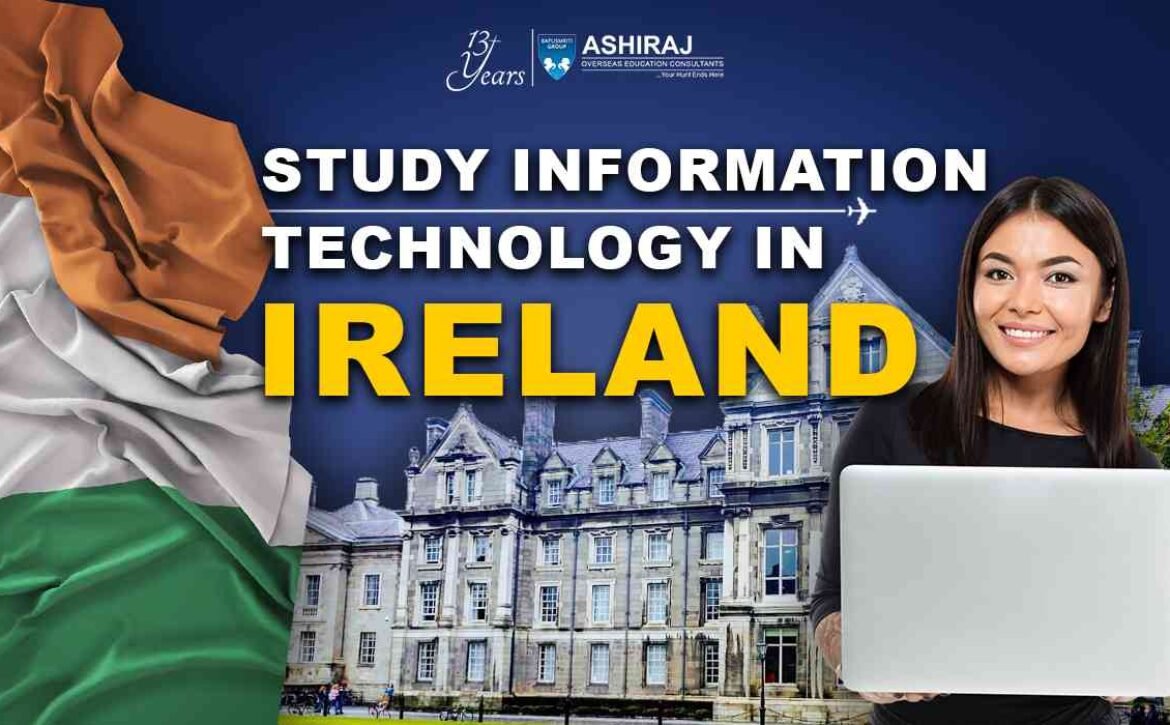
Information Technology in Ireland
Ireland has emerged as a vibrant hub for information technology, with its rapidly growing tech sector contributing significantly to the country’s economy and global reputation. Information technology in Ireland encompasses a broad spectrum of activities, ranging from software development and cybersecurity to data analytics and cloud computing. The country’s strategic location, skilled workforce, favorable business environment, and supportive government policies have attracted numerous multinational tech companies to establish their European headquarters or significant operations in Ireland, further fueling the growth of the IT industry.
In recent years, Ireland has positioned itself as a leading destination for tech talent and innovation, with cities like Dublin, Cork, and Galway serving as bustling tech hubs. The collaborative ecosystem of startups, academia, research institutions, and established corporations fosters a culture of innovation and entrepreneurship, driving advancements in information technology. With a strong emphasis on digital transformation across various sectors, including finance, healthcare, and manufacturing, Ireland continues to solidify its position as a global leader in information technology, poised for further growth and innovation in the years to come.
Why to Study Information Technology in Ireland?
- Thriving Tech Industry: Ireland boasts a dynamic and rapidly expanding information technology sector, offering abundant opportunities for students to gain hands-on experience and pursue rewarding careers.
- Global Tech Giants: With multinational tech giants like Google, Facebook, and Microsoft establishing their European headquarters or significant operations in Ireland, students have access to world-class resources, mentorship, and networking opportunities.
- Innovative Ecosystem: Ireland’s collaborative ecosystem of startups, research institutions, and established corporations fosters innovation and entrepreneurship, providing students with a stimulating environment to develop their skills and ideas.
- Skilled Workforce: The country’s emphasis on education and training ensures a highly skilled workforce, making it an attractive destination for tech companies and offering students the chance to learn from industry experts.
- Strategic Location: Situated at the crossroads of Europe and the United States, Ireland provides students with exposure to diverse markets and cultures, enhancing their global perspective and career prospects.
- Supportive Environment: Ireland’s supportive government policies, favorable business climate, and quality of life make it an ideal destination for international students seeking a welcoming and enriching educational experience.
- Digital Transformation: With a strong focus on digital transformation across various sectors, studying information technology in Ireland equips students with the knowledge and skills needed to drive innovation and lead the way in shaping the future of technology.
In conclusion, studying information technology in Ireland offers students a unique blend of academic excellence, industry relevance, and global opportunities, making it a compelling choice for those aspiring to excel in the dynamic field of IT.
Top Universities to Study Information Technology in Ireland
University | QS World University Rankings 2023 | Type of University | Average Annual Fees (EUR) | Programs Offered |
Trinity College Dublin | 50 | Public | €15,000 – €25,000 | Computer Science, IT Management, Cybersecurity |
University College Dublin | 75 | Public | €14,000 – €24,000 | Computer Science, Data Science, Information Systems |
National University of Ireland, Galway | 250 | Public | €12,000 – €22,000 | Computer Science, Software Engineering, Digital Innovation |
Dublin City University | 300 | Public | €13,000 – €23,000 | Computer Applications, Computing, Information Technology |
University College Cork | 350 | Public | €13,000 – €23,000 | Computer Science, Computer Engineering, Information Systems |
Studying information technology in Ireland offers students a plethora of options, with several universities renowned for their excellence in the field. Here’s a list of the top universities in Ireland for information technology, along with their QS World University Rankings 2023, type of university, average annual fees, and programs offered. These universities provide comprehensive programs covering various aspects of information technology, from computer science and cybersecurity to data science and digital innovation. With their strong academic reputation, state-of-the-art facilities, and industry connections, students can expect a rewarding educational experience that prepares them for successful careers in the rapidly evolving IT industry.
Course Curriculum for Information Technology in Ireland
- Cutting-edge Modules: The course curriculum of Information Technology in Ireland is designed to equip students with a comprehensive understanding of the latest trends and technologies in the field.
- Core Subjects: Students delve into core subjects such as programming languages, database management, networking, and system analysis, laying a strong foundation for their IT careers.
- Specialized Tracks: The curriculum offers specialized tracks in areas like cybersecurity, data analytics, cloud computing, and artificial intelligence, allowing students to tailor their studies to their interests and career goals.
- Practical Learning: Emphasis is placed on practical learning through hands-on projects, internships, and industry collaborations, enabling students to apply theoretical knowledge to real-world scenarios.
- Industry Relevance: The curriculum is continuously updated to reflect the evolving needs of the IT industry, ensuring that graduates are equipped with the skills and knowledge required to succeed in the dynamic tech landscape.
- Soft Skills Development: Alongside technical skills, the curriculum also focuses on developing soft skills such as communication, teamwork, and problem-solving, essential for thriving in diverse IT environments.
Information technology in Ireland offers a well-rounded course curriculum that prepares students to excel in the fast-paced and ever-changing field of technology, setting them up for successful and fulfilling careers.
Eligibility Criteria & Admission Requirements for MS in Information Technology in Ireland
- Language Proficiency: Applicants must demonstrate proficiency in English through standardized tests such as IELTS or TOEFL. Minimum scores typically range from 6.0 to 6.5 for IELTS and 80 to 90 for TOEFL.
- Standardized Tests: Some universities may require applicants to submit scores for standardized tests like GRE or GMAT. While there is no fixed cutoff, competitive scores are usually in the range of 310 to 320 for GRE and 650 to 700 for GMAT.
- Educational Qualifications: Candidates should hold a bachelor’s degree in a relevant field, such as computer science, information technology, or a related discipline, from a recognized institution.
- Passport & Student Visa: International students must possess a valid passport and obtain a student visa to study in Ireland. The visa application process typically requires proof of acceptance from an Irish university, financial means, and health insurance.
- Academic Certificates: Applicants need to submit transcripts and academic certificates from their previous educational institutions, demonstrating their academic qualifications and achievements.
- Work Experience: While not always mandatory, some universities may prefer applicants with relevant work experience in the IT field, which can strengthen their application.
Test | Minimum Score |
IELTS | 6.5 |
TOEFL | 90 |
GRE | 320 |
GMAT | 700 |
Meeting these eligibility criteria ensures that candidates are well-prepared and qualified to pursue a degree in information technology in Ireland, facilitating a smooth transition into their academic journey and future career endeavors.
Documents Required for Studying Information Technology in Ireland
- Passport: A valid passport is essential for international students applying to study information technology in Ireland.
- Letters of Recommendation (LOR): Applicants typically need to provide two letters of recommendation from academic or professional references attesting to their qualifications and character.
- Statement of Purpose (SOP): A well-written SOP outlining the applicant’s academic background, career goals, and reasons for choosing information technology in Ireland is required.
- Curriculum Vitae (CV): A comprehensive CV highlighting the applicant’s educational achievements, work experience, skills, and extracurricular activities is necessary.
- Official Transcripts: Official high school transcripts and educational certificates demonstrating academic qualifications and achievements are mandatory.
- Work Experience Certificate: If applicable, a work experience certificate verifying any relevant professional experience in the IT field should be submitted.
- Proof of Financial Resources: Applicants must provide evidence of sufficient financial resources to cover tuition fees, living expenses, and other costs associated with studying and living in Ireland.
Gathering and submitting these documents accurately and promptly is crucial for a successful application to pursue information technology in Ireland. These documents provide the necessary information for universities to assess the applicant’s suitability for the program and ensure compliance with visa requirements.
Admission Process for Information Technology in Ireland
- Research: Conduct thorough research on universities offering information technology programs in Ireland and carefully review their admission requirements, program details, and application deadlines.
- Prepare Documents: Gather all required documents, including academic transcripts, standardized test scores (if applicable), letters of recommendation, statement of purpose, curriculum vitae, passport, and proof of financial resources.
- Submit Application: Complete the online application form for your chosen universities, ensuring accuracy and completeness. Pay attention to any specific instructions or additional requirements outlined by each institution.
- Pay Application Fees: Pay the application fees as required by the universities you are applying to. Fees may vary between institutions and are usually non-refundable.
- Wait for Admission Decision: After submitting your application, patiently await the admission decision. This process may take several weeks to months, depending on the university and program.
- Acceptance and Visa: If accepted, carefully review the offer letter and follow the instructions provided to confirm your acceptance. Begin the process of obtaining a student visa by submitting the necessary documents to the Irish embassy or consulate in your country.
- Arrival and Enrollment: Once you receive your student visa, make travel arrangements to Ireland. Upon arrival, attend orientation sessions, complete any remaining enrollment procedures, and prepare to embark on your journey of studying information technology in Ireland.
Following these steps diligently will help streamline the admission process for studying information technology in Ireland, ensuring a smooth transition into academic life in the country.
“Education is the most powerful weapon which you can use to change the world.”
Nelson Mandela
Cost of Information Technology Course in Ireland
- Tuition Fees: The tuition fees for information technology programs in Ireland vary depending on the university, program level, and nationality of the student. On average, tuition fees range from €12,000 to €25,000 per year for international students.
- Living Expenses: Living expenses, including accommodation, food, transportation, and miscellaneous costs, also contribute to the overall cost of studying in Ireland. Students should budget approximately €10,000 to €12,000 per year for living expenses.
- Health Insurance: International students are required to have health insurance coverage during their stay in Ireland. The cost of health insurance ranges from €300 to €600 per year, depending on the coverage options selected.
- Additional Costs: Additional expenses may include visa application fees, textbooks, study materials, extracurricular activities, and travel. Students should budget accordingly to cover these expenses.
- Scholarships and Financial Aid: Some universities in Ireland offer scholarships, grants, and financial aid opportunities to international students. Eligibility criteria and application procedures vary, so students should research and apply for available scholarships to help offset the cost of studying information technology in Ireland.
Understanding the cost of studying information technology in Ireland is essential for prospective students to plan their finances and make informed decisions about pursuing higher education in the country.
Scholarships for Information Technology Courses in Ireland
Scholarship Name | Amount | Application Deadline |
Government of Ireland International Education Scholarships | Up to €10,000 | March 31 |
Trinity College Dublin Scholarships | Varies | May 1 |
University College Dublin Global Excellence Scholarship | Up to 50% tuition fee reduction | June 15 |
National University of Ireland, Galway International Student Scholarships | €3,000 – €5,000 | April 15 |
Dublin City University International Scholarships | Up to €2,000 | April 30 |
Information technology in Ireland offers numerous scholarship opportunities for international students to pursue their studies. Here’s a list of scholarships available for information technology programs in Ireland, along with their respective amounts and application deadlines. These scholarships aim to support students financially and recognize academic excellence, enabling them to focus on their studies and thrive in the dynamic field of information technology. Prospective students should carefully review the eligibility criteria and application requirements for each scholarship and submit their applications before the deadlines to maximize their chances of securing financial assistance for their studies.
Career Opportunities After Information Technology in Ireland
Job Profile | Average Salary (EUR) |
Software Developer | €40,000 – €60,000 |
IT Consultant | €45,000 – €70,000 |
Data Analyst | €35,000 – €55,000 |
Network Engineer | €45,000 – €65,000 |
Cybersecurity Analyst | €50,000 – €80,000 |
Information technology in Ireland offers a plethora of career opportunities for graduates in the field. Here’s a list of common job profiles along with their average salaries.
- Software Developer: Responsible for designing, developing, and maintaining software applications. Average salary ranges from €40,000 to €60,000 per year.
- IT Consultant: Provides advice and solutions to organizations on how to utilize information technology to meet their business objectives. Average salary ranges from €45,000 to €70,000 per year.
- Data Analyst: Analyzes data to extract insights and inform business decisions. Average salary ranges from €35,000 to €55,000 per year.
- Network Engineer: Designs, implements, and manages computer networks. Average salary ranges from €45,000 to €65,000 per year.
- Cybersecurity Analyst: Protects computer systems and networks from cyber threats. Average salary ranges from €50,000 to €80,000 per year.
With competitive salaries and abundant job opportunities, pursuing a career in information technology in Ireland can be highly rewarding for professionals in the field.
Frequently Asked Questions About Information Technology in Ireland
Trinity College Dublin, University College Dublin, and National University of Ireland, Galway are among the top universities offering information technology programs in Ireland.
Yes, several scholarships such as the Government of Ireland International Education Scholarships and university-specific scholarships are available for international students pursuing information technology in Ireland.
The average tuition fee for information technology programs in Ireland ranges from €12,000 to €25,000 per year for international students.
Career opportunities include roles like software developer, IT consultant, data analyst, network engineer, and cybersecurity analyst, with salaries ranging from €35,000 to €80,000 per year.
While not always mandatory, some universities may prefer applicants with relevant work experience in the IT field, which can strengthen their application.
Applicants must demonstrate proficiency in English through standardized tests such as IELTS or TOEFL, with minimum scores typically ranging from 6.0 to 6.5 for IELTS and 80 to 90 for TOEFL.
International students can obtain a student visa by submitting necessary documents, including proof of acceptance from an Irish university, financial means, and health insurance, to the Irish embassy or consulate in their country.
Yes, international students are allowed to work part-time during their studies in Ireland, typically up to 20 hours per week during term time and full-time during holidays.
Housing options include on-campus accommodation, off-campus private rentals, shared apartments, and homestays, with prices varying depending on location and amenities.
You can stay updated by following industry news websites, attending tech events and conferences, joining professional networking groups, and engaging with the IT community on social media platforms.




